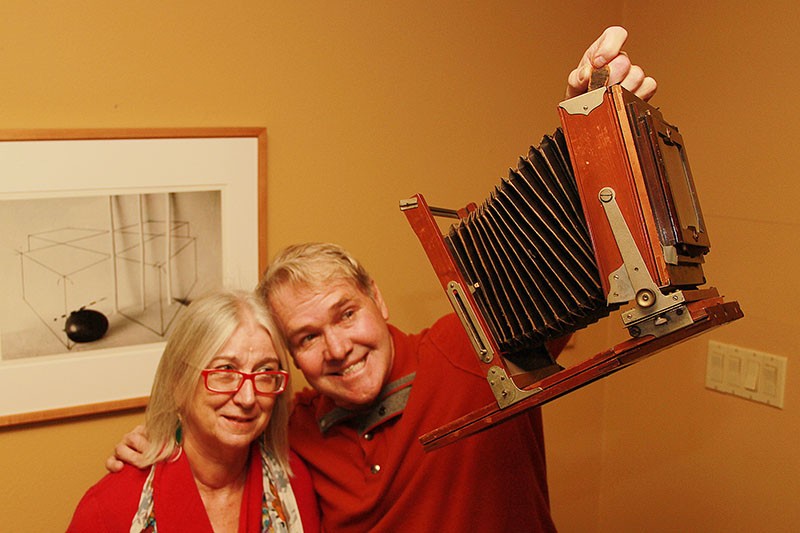I've been a fan of Trish Simonite's beautiful photographs since I first saw her series of English seaside amusement parks. She's influenced an entire generation of young local photographers as a professor at the Southwest School of Art and Trinity University. Raised in the English countryside, she met dashing Texan Richard Simonite and soon found herself moving to America in 1968. Originally a painter, she took a photography workshop with Harry Boyd Jr. in Austin (during the time she and her husband lived in a dome) and she became hooked. Her works have been shown around the world. She's currently winding down her academic career at Trinity, after which she will spend her time traveling with her husband, camera at her side.
What was your first experience with photography?
My dad took lots of photographs and Super 8 films of us so I was around cameras growing up. I didn't take photographs as a child; I painted. I owe a great deal of my love for art to Cavendish Morton III, my painting teacher at the Hethersett Old Hall School. After marrying and moving to Houston, I took photographs when I worked for The Texas Rehabilitation and Research Hospital as an assistant to the editor of a small hospital newspaper called The Promethean.
It was later I really fell in love with photography as a medium. My husband, Richard, bought a Nikon F and we both took a [University of Texas at Austin] community class in photography class from Harry Boyd Jr. It was an experimental photography course. We set up a darkroom at home, and I was hooked. Harry went on to organize an exhibition in the student union and published some of my work in a book called A Creative Approach To Photography.
Do you lament the demise of film photography? My father was a photographer, I've taken pictures since I was 10 years old, and I can honestly say I never mastered the art of film photography. Digital cameras have allowed me to explore and experiment with images beyond anything I ever imagined.
I still teach traditional photography as well as digital photography. I love teaching darkroom practices to students. It is a popular class at Trinity; classes fill up every term. I don't think traditional photography will disappear. There are still companies that make film and chemistry as well as alternative photographic processes chemistry. When Polaroid went out of business another company, The Impossible Project, started making a similar product.
However, I shoot and work primarily digitally these days. My work is related to travel and it is so much easier to shoot digitally and I shoot more. I still have my 35-millimeter camera, a medium format camera and a four-by-five view camera. My plan is to make work with some of those cameras in the future, now that I will be teaching less and will have more time to work.
I'm going to be blunt here: How do you teach photography to a generation of kids who all believe they already are—thanks to their phones—good photographers?
One of the most important things I do is that I show them a lot of photographers' work, both historic and contemporary, to cultivate an appreciation for fine art photography. I think it is important for them to really understand all the camera controls and be able to make decent prints in the darkroom or in the digital lab. Then I encourage them to discover the subjects and types of photography they are drawn to. I make beginning digital photographers print black and white for the first few assignments. You cannot get away with bad composition in black and white! As students are exposed to these things they begin to have an appreciation for the art of photography and what goes into making good work.
I have noticed lately that some of the things that seem intuitive to me, like focusing the image, are not natural to this generation! They are used to just pushing a button and getting a result!
What's the best piece of advice you give to your students?
The most important piece of equipment you have is your brain! Your experiences, interests, background are unique. Draw on them to inform your work.
Since its inception, there has always been an issue of photography being fine art. I think it's a complete non-issue, but it seems to have reared its ugly head again with the record-breaking sale of Peter Lik's Phantom. Your thoughts?
It seems absurd to me that this question of whether or not photography is fine art should keep coming up. Of course photography in the hands of the great photographers is indisputably fine art. Photography is such a vibrant, flexible, adaptive medium. Today it is everywhere.


